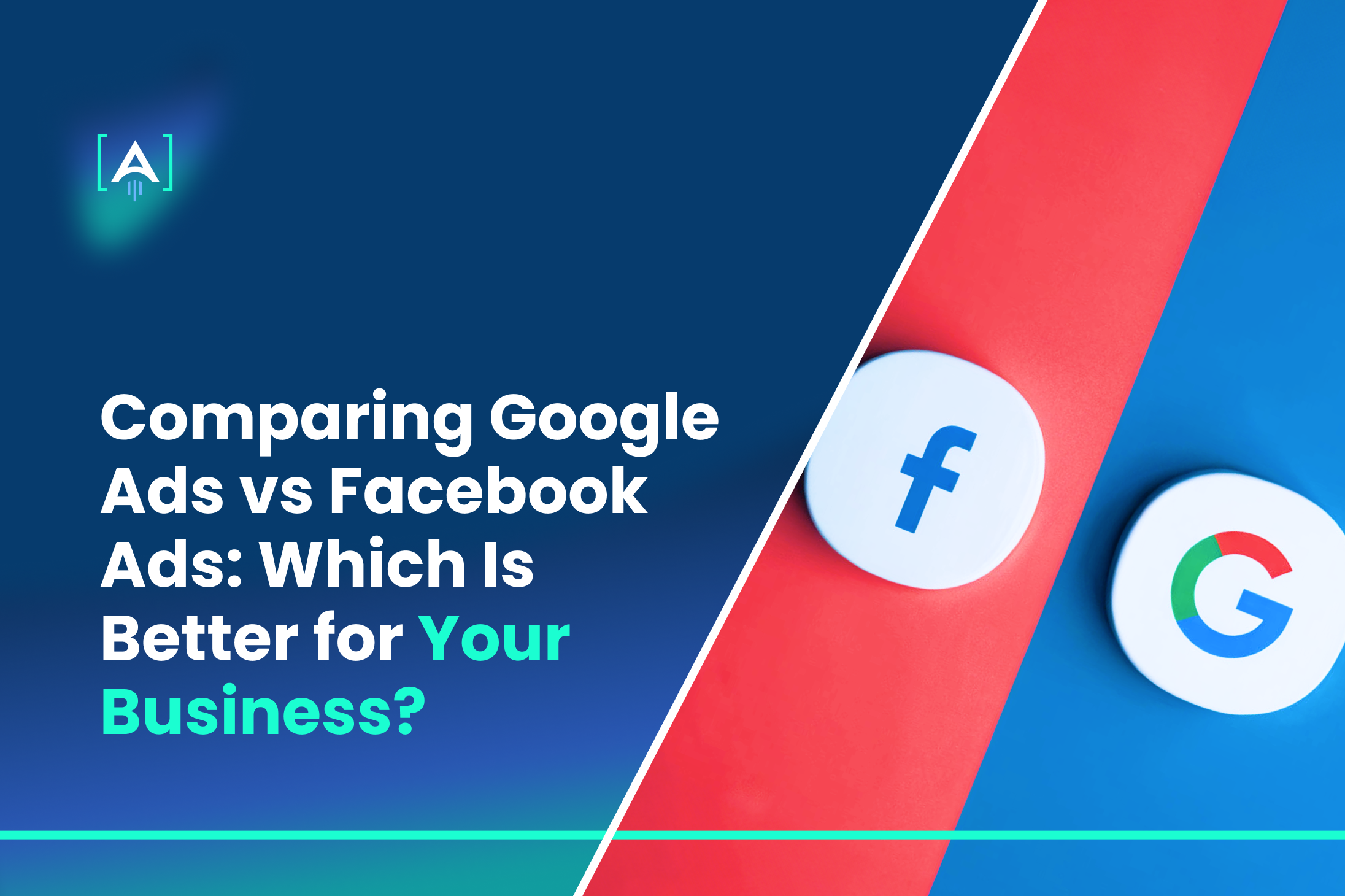As a business owner, you face critical decisions about where to allocate your advertising budget.
Should you focus on Google Ads vs Facebook Ads, or is there a strategic way to leverage both?
Understanding the strengths of each platform is crucial to maximizing your return on investment.
Google Ads is often favored for capturing high-intent users actively searching for products or services, primarily through Google Display Network ads that reach users across millions of websites.
In contrast, Facebook Ads excels at detailed audience targeting, making it ideal for building brand awareness and engaging potential customers in their social media environment.
When your goal is to target users with specific interests and behaviors or choose between Google Ads vs Facebook Ads, the expertise of a Facebook Ads agency can be invaluable in crafting campaigns that truly resonate with your audience
By the end of this article, you’ll learn how to run Facebook ads, be well-prepared to make an informed decision on whether Facebook Ads vs Google Ads—or a combination of both—can best drive your business’s growth.
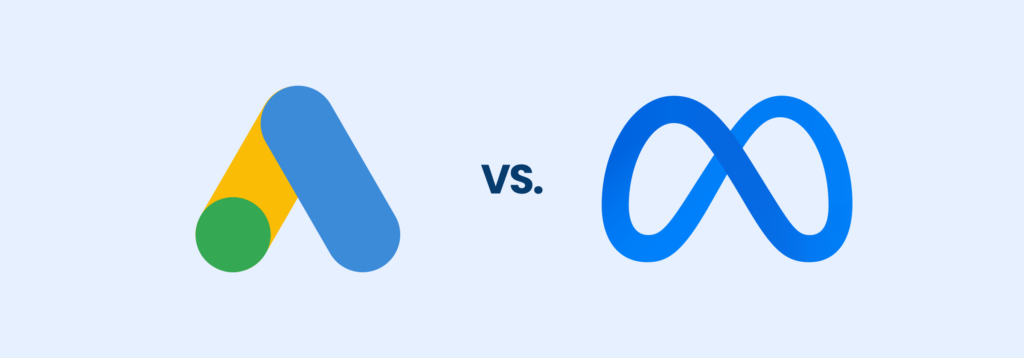
Understanding Google Ads: Features and Benefits
Google Ads is one of the most powerful digital marketing tools that allows businesses to target users precisely when searching for products or services.
With over 8.5 billion searches conducted daily on Google, the platform provides access to a massive audience through various ad formats, such as Google Search Ads, Google Display Ads, and Shopping Ads.
When analyzing Facebook ads vs Google ads, it’s essential to recognize that Facebook excels in audience targeting based on demographics and interests, while Google captures users with high intent through search queries.
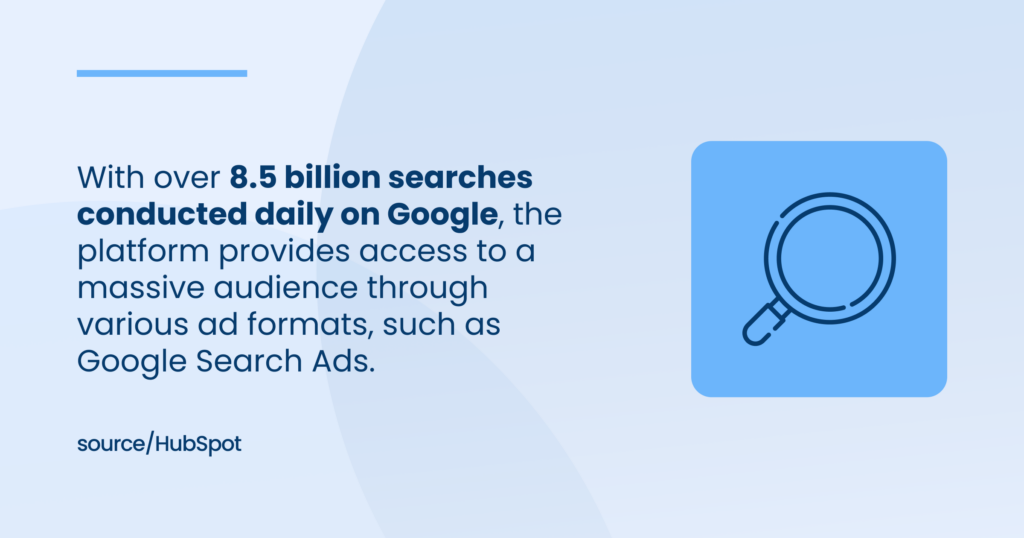
Google Ads allows businesses to continuously optimize their ad campaigns, using performance data to adjust bids, targeting, and ad formats to maximize conversions.
This makes it a formidable choice for businesses aiming to capture high-intent users directly from Google search results when comparing Google Ads vs. Facebook Ads.
Interestingly, Google Ads generates an average ROI of 8:1, meaning businesses earn eight dollars in return for every dollar spent.
This underscores the platform’s effectiveness in driving tangible results for advertisers.
Source: Google Ads
Understanding Facebook Ads: Features and Benefits
Facebook Ads is an even more powerful platform for advertising, reaching, and engaging with target audiences.
If businesses further increase the statistics, they’re targeting a pool of nearly 3 billion monthly active users with advanced options of targeting based on demographic, interest, and behavioral parameters.
Through Facebook Ads Manager, you can create highly tailored campaigns utilizing various ad formats, such as images, videos, and carousels.
The platform is specifically effective for businesses looking to build brand awareness, foster community engagement, and drive conversions at a lower average Facebook Ads cost than Google Ads.
In the context of Facebook ads vs Google ads, Facebook shines in its ability to engage users through personalized, social experiences.
Facebook’s strength lies in its ability to reach users in a social and engaging context, making it ideal for brands focused on storytelling and customer interaction.
With tools like Facebook Ads Library for transparency and Facebook Ads Management for optimization, the platform offers businesses an effective and better way to connect with their target audience.
In the “fight” of Google Ads vs Facebook Ads, or even Facebook Ads vs LinkedIn Ads, Facebook is particularly valuable for businesses that want to create deep connections with their customers through visually appealing content and social interaction.
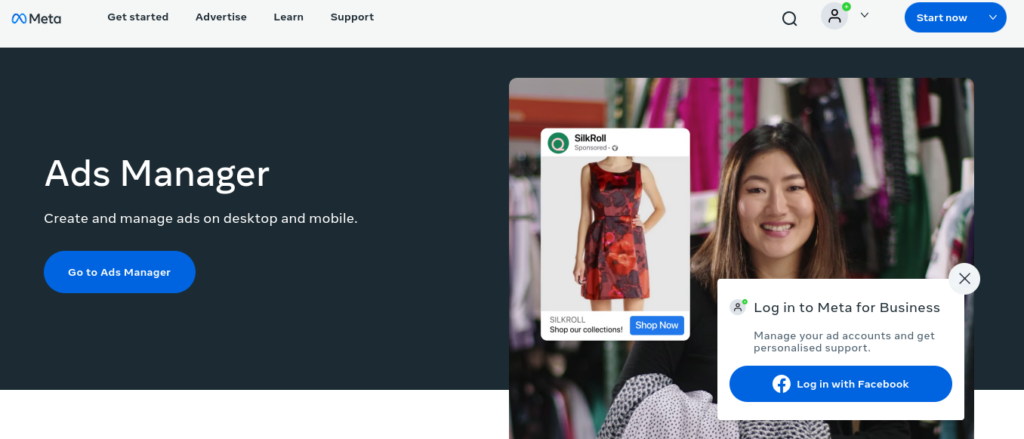
Source: Meta
Comparing Key Features: Google Ads vs Facebook Ads
When deciding whether to create Facebook ads, Google ads, or maybe Linkedin or Instagram ads for the future, consider the strengths of each platform: examining their unique features, target capabilities, and overall effectiveness for different business goals is essential.
Below, we’ll explore these key aspects in detail.
Audience Targeting
Google Ads:
- Keyword Targeting: Google Ads allows businesses to target users based on specific search queries through Google Search Ads. This is ideal for reaching customers with high purchase intent, as your ads appear in Google search results when users actively search for relevant products or services.
- Audience Targeting: Beyond keywords, Google Display Ads can target users according to their online behavior, interests, and demographics. This broader approach works well for increasing brand awareness and engaging users across the Google Display Network.
Facebook Ads:
- Demographic and Behavioral Targeting: Facebook Ads excels at granular audience targeting. Through Facebook Ads Manager, businesses can target users based on age, gender, interests, behaviors, and even life events. This makes it a powerful tool for brands wanting to connect with a specific audience.
- Custom Audiences and Lookalike Audiences: Facebook also offers advanced options like Custom Audiences, which allow you to target users who have interacted with your brand in the past, and Lookalike Audiences, which help you find new users similar to your best customers.

Ad Formats
Google Ads:
- Search Ads: These are text-based ads that appear in Google search results, making them ideal for capturing users at the moment of intent. Google Search Ads are highly effective for driving conversions, especially in competitive markets.
- Display Ads: Google Display Ads are visually oriented ads that pop up across the Google Display Network. They are excellent for retargeting users and building brand recognition.
- Shopping Ads: For e-commerce businesses, Shopping Ads display product images, prices, and descriptions directly in search results, providing a highly visual and direct way to attract buyers.
Facebook Ads:
- Image and Video Ads: Facebook offers a variety of visually rich ad formats, including single image ads, video ads, and carousel ads that let you showcase multiple products or messages in a single ad. These formats are designed to be engaging and shareable, making them perfect for storytelling and brand engagement.
- Interactive Ads: Facebook also provides interactive ad formats like Instant Experience (formerly Canvas) and Collection Ads, which offer immersive, full-screen experiences directly within the platform, enhancing user engagement and driving conversions.
Cost and ROI
Google Ads:
- Cost Structure: Google Ads generally works on a pay-per-click (PPC) model, which means you pay each time a user clicks on your ad. The cost can differ depending on the competition for your chosen keywords. For example, highly competitive industries like finance or legal services often have higher costs per click.
- ROI: Despite potentially higher costs, Google Ads often delivers a strong return on investment (ROI), especially for businesses targeting high-intent users. The average ROI for Google Ads is around 8:1, making it a valuable tool for driving conversions and sales.
Facebook Ads:
- Cost Structure: Facebook Ads typically offer a lower cost-per-click (CPC) than Google Ads, making it more accessible for businesses with smaller budgets. The platform’s flexible pricing allows you to set daily or lifetime budgets for your ad campaigns.
- ROI: While the cost is lower, the ROI can vary depending on your campaign goals. Facebook is particularly effective for campaigns focused on brand awareness, engagement, and social interaction, where the goal is not immediate conversion but rather long-term customer relationship building.
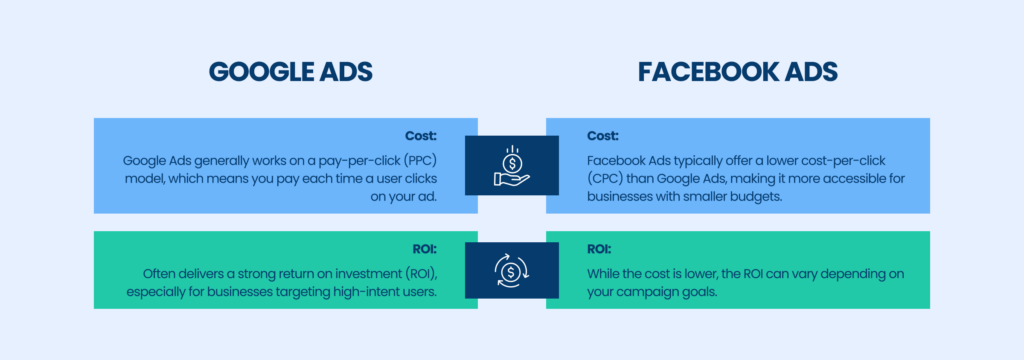
Ad Management and Optimization
Google Ads:
- Ad Management Tools: Google provides robust tools for managing and optimizing ad campaigns, including Google Ads Manager and Google AdWords. These tools offer detailed analytics and reporting, allowing businesses to track performance, adjust bids, and optimize campaigns for better results.
- Automation and AI: Google Ads also incorporates automation features, such as Smart Bidding, which uses machine learning to optimize real-time bids for better conversions.
Facebook Ads:
- Facebook Ads Manager: This is the main core for managing your Facebook ad campaigns. It offers powerful tools for targeting, budgeting, and performance analysis, allowing you to optimize campaigns on the fly.
- Creative Testing: Facebook’s platform is designed for high-tempo testing, allowing you to quickly test different ad creatives and targeting strategies to see what connects best with your audience.
When comparing Google Ads vs Facebook Ads, the best platform for your business depends on your specific goals, budget, and target audience.
Google Ads is unparalleled for reaching users with high purchase intent and driving direct conversions.
At the same time, Facebook Ads excels at creating engaging, community-focused campaigns that build brand loyalty over time.
For many businesses, integrating both platforms into a cohesive strategy can offer the best of both worlds, ensuring you reach your audience at every stage of their journey.
When to Use Google Ads
Google Ads is particularly effective when your goal is to capture high-intent users actively searching for your products or services.
Suppose your business thrives on immediate conversions, such as in the e-commerce or service industries.
In that case, Google Search Ads can put your brand at the top position of Google search results when potential customers are most likely to purchase.
Moreover, Google Display Network and Shopping Ads offer a versatile reach and visual engagement, making them suitable for building brand awareness and showcasing products directly to interested buyers.
This makes Google a powerful tool in the Facebook ads vs Google ads debate, especially for businesses targeting high-intent users.
Google Ads is also ideal for businesses with competitive keywords that drive traffic and for those looking to utilize a variety of ad formats across multiple touchpoints, showcasing its adaptability to diverse business needs.
For businesses deciding between Facebook ads vs Google ads, Google Ads is particularly effective when your goal is to capture high-intent users.
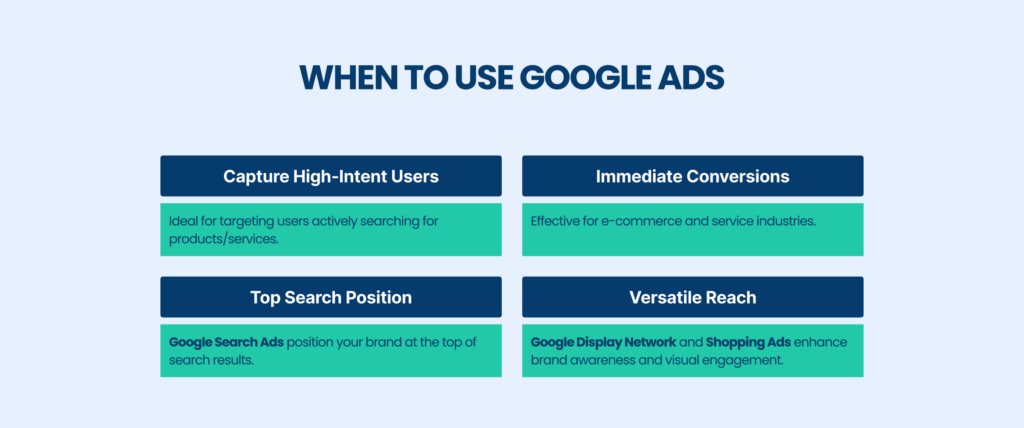
This advertising platform is also advantageous for businesses with larger budgets that can support ongoing ad campaigns and bid adjustments through Google AdWords.
Whether your focus is on direct response or brand building, Google advertising provides robust tools and targeting options to meet diverse business needs.
When to Choose Facebook Ads
Facebook Ads are ideal for businesses that prioritize building strong brand awareness and engaging with their target audience through highly personalized content.
With advanced targeting options in Facebook Ads Manager, you can reach specific demographics, making your campaigns more effective at driving engagement and loyalty.
Facebook’s ad formats—like images, videos, and carousels—are compelling for businesses that rely on visual storytelling.
They let you create immersive experiences that resonate emotionally with your audience, making building and sustaining long-term relationships easier.
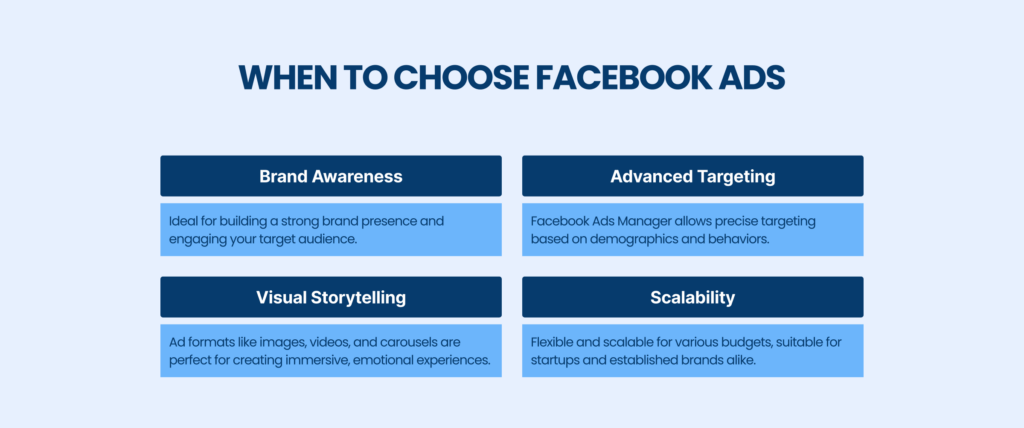
Facebook advertising is not just flexible- it’s scalable, catering to a wide range of budgets while still offering robust performance tracking and optimization tools.
This scalability makes it an excellent platform for both startups and established brands looking to run dynamic, scalable ad campaigns.
Whether your goal is boosting brand visibility, driving website traffic, or generating leads, you can tailor Facebook Ads to meet your business needs.
Integrating Both Platforms: Google Ads and Facebook Ads
We already went through the Google Ads vs Facebook Ads, now integrating Google Ads and Facebook Ads can amplify your marketing efforts by utilizing the strengths of both platforms.
Google Search Ads are perfect for capturing users with high purchase intent, appearing directly in Google search results when potential customers actively seek your products or services.
On the other hand, Facebook Ads excel at nurturing relationships and building brand awareness through engaging, visually-rich content, thanks to the platform’s diverse ad formats like images, videos, and carousels.
Using the unique strengths of both platforms, you can craft a seamless customer journey that guides users through every stage of their buying process.
For instance, initiate with Google Display Ads to foster awareness and then follow up with retargeting ads on Facebook to re-engage users who have previously interacted with your brand.
This cross-platform strategy is about maintaining consistent messaging and driving users from awareness to conversion with utmost efficiency.
The integration lets you diversify your ad campaigns and reach broader audiences across multiple ad platforms.
You can use the data from Google Ads to refine your keyword strategy and apply those insights to your Facebook advertising efforts for better-targeted campaigns.
Similarly, the audience data from Facebook can inform your approach to Google advertising, helping you to fine-tune your bids and improve the efficiency of your ad spend.
Furthermore, the ability to track user behavior and conversions across both platforms provides a comprehensive view of your campaign performance.
This profound insight empowers you to optimize your overall strategy, allowing you to allocate your budget more effectively and maximize ROI. For example, suppose your Google Ads are driving traffic but not converting.
In that case, you can use Facebook Ads to re-engage those visitors with tailored offers or content, improving the chances of conversion.
This control over your campaigns is invaluable in the digital marketing landscape.
Using tools like Google Ads Manager and Facebook Ads Manager, you can synchronize your campaigns, ensuring your brand message remains constant across all channels.
This enhances brand recall and improves the user experience by delivering relevant content at the right time.
In conclusion, integrating Google Ads and Facebook Ads offers a comprehensive approach to digital marketing, enabling you to use each platform’s unique strengths.
Doing so can drive greater brand awareness, engage with your target audience more actively and effectively, and ultimately achieve better conversion rates across the board.
Key Strategies to Maximize the potential of both platforms
Integrating Google Ads and Facebook Ads enhances your marketing strategy when you are using both of the platforms for your business. Here’s how to maximize their potential:
- Sync Campaigns Across Platforms: Use data from Google Ads Manager to inform Facebook Ads Manager strategies, ensuring consistent messaging.
- Target Different Stages: Start with Google Search Ads for high-intent users and follow up with Facebook Ads for nurturing leads.
- Retarget Effectively: Use Google Display Network to drive awareness, then retarget those users on Facebook for higher conversion.
- Optimize Budget Allocation: Analyze performance data from both platforms to allocate your budget where it drives the best results.
- Test and Adjust: Regularly test different ad formats and adjust based on what performs best on each platform.
Integrating these strategies allows you to create a more cohesive and effective digital marketing approach that drives more robust results across your entire ad platform ecosystem.
Partner with [A] Growth Agency for Integrated Campaigns
Integrating Google Ads and Facebook Ads into your marketing strategy has the potential to unlock exponential growth.
You can engage with your target audience across various channels by leveraging Google Ads to capture high-intent searches and Facebook Ads to build robust and engaging brand experiences.
This powerful yet strategic combination allows you to create a holistic advertising approach that attracts new customers and nurtures them into loyal advocates, paving the way for significant business growth.
At [A] Growth Agency, we understand the nuances of both Google and Facebook advertising. Our team specializes in creating customized, data-driven campaigns that maximize your ad spend across both platforms.
Whether you want to dominate Google search results with precise Google Search Ads or craft compelling narratives using Facebook’s ad formats, we’ve got you covered.
We also recognize the importance of tracking and optimizing your campaigns.
By analyzing performance across the Google Display Network and Facebook Ads, we ensure your strategy is continuously refined to achieve the best possible ROI.
With our experience as a Facebook Ads agency, you can be guaranteed that your marketing dollars are being used effectively, driving meaningful results for your business.
